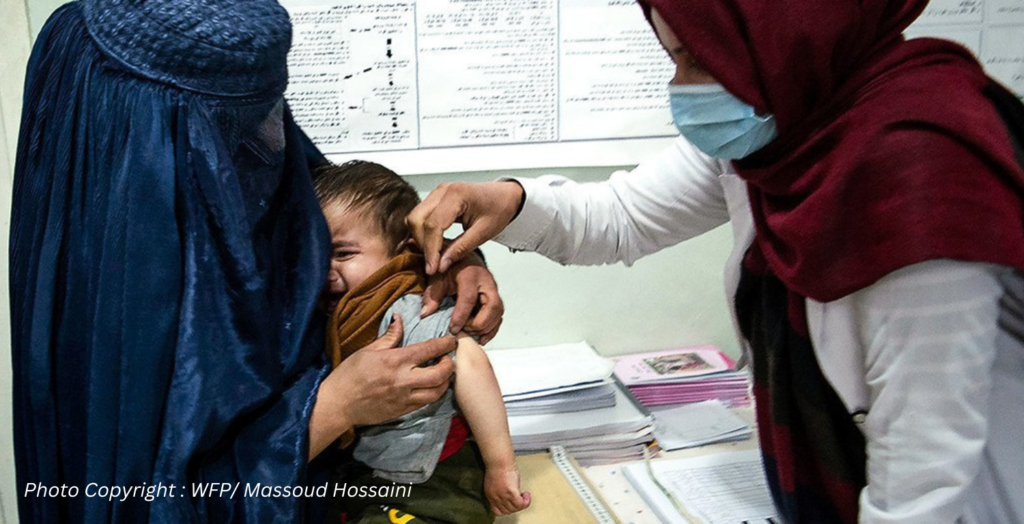New York, December 28 – Heads of United Nations agencies and humanitarian groups denounced the Afghan Taliban government’s ban of women working with non-governmental organizations as a life-threatening measure against the Afghan people.
A joint statement issued by 20 Principals of the Inter-Agency Standing Committee on Afghanistan demanded that women’s participation in aid delivery must continue.
“The decision by Afghanistan’s de facto authorities to ban women from working in humanitarian non-governmental organizations is a major blow for vulnerable communities, for women, for children, and for the entire country,” the statement said.
“Female staff are key to every aspect of the humanitarian response in Afghanistan. They are teachers, nutrition experts, team leaders, community health workers, vaccinators, nurses, doctors, and heads of organizations,” it said.
The statement said women have access to certain populations that male colleagues cannot have and their professional work is indispensable and can save lives.
“Banning women from humanitarian work has immediate life-threatening consequences for all Afghans,” the statement said.
The statement said the ban is taking place at a time when more than 28 million people in Afghanistan are struggling to survive while the country is grappling with “famine conditions, economic decline, entrenched poverty and a brutal winter.”
“While humanitarian organizations continue to engage the de facto authorities, we cannot ignore the operational constraints now facing us as a humanitarian community. “We will endeavor to continue lifesaving, time-critical activities unless impeded while we better assess the scope, parameters and consequences of this directive for the people we serve. But we foresee that many activities will need to be paused as we cannot deliver principled humanitarian assistance without female aid workers.
“We remain resolute in our commitment to deliver independent, principled, lifesaving assistance to all the women, men and children who need it.
“We urge the de facto authorities to reconsider and reverse this directive, and all directives banning women from schools, universities and public life. No country can afford to exclude half of its population from contributing to society.”
Signatories
• Mr. Martin Griffiths, Emergency Relief Coordinator and Under-Secretary-General for Humanitarian Affairs (OCHA)
• Mr. Qu Dongyu, Director-General, Food and Agriculture Organization (FAO)
• Ms. Shahin Ashraf, Chair, International Council of Voluntary Agencies (ICVA) Board, (Islamic Relief)
• Mr. Ignacio Packer, Executive Director, International Council of Voluntary Agencies (ICVA)
• Ms. Miriam Sapiro, President and Chief Executive Officer, InterAction
• Ms. Tjada D’Oyen McKenna, Chief Eexcutive Officer, Mercy Corps
• Ms. Janti Soerpinto, President and Chief Executive Officer, Save the Children US
• Mr. António Vitorino, Director General, International Organization for Migration (IOM)
• Mr. Volker Turk, United Nations High Commissioner for Human Rights (OHCHR)
• Mr. Andrew Morley, President and Chief Executive Officer, World Vision International
• Ms. Sofia Sprechmann Sineiro, Secretary-General, CARE International
• Ms. Paula Gaviria Betancur, United Nations Special Rapporteur on the Human Rights of Internally Displaced Persons (UN SR on HR of IDPs)
• Mr. Achim Steiner, Administrator, United Nations Development Programme (UNDP)
• Dr. Natalia Kanem, Executive Director, United Nations Population Fund (UNFPA)
• Ms. Maimunah Mohd Sharif, Executive Director, United Nations Human Settlement Programme (UN-Habitat)
• Mr. Filippo Grandi, United Nations High Commissioner for Refugees (UNHCR)
• Ms. Catherine Russell, Executive Director, United Nations Children’s Fund (UNICEF)
• Ms. Sima Bahous, Under-Secretary-General and Executive Director (UN Women)
• Mr. David Beasley, Executive Director, World Food Programme (WFP)
• Dr. Tedros Adhanom Ghebreyesus, Director-General, World Health Organization (WHO)
Four NGOs stop work in Afghanistan
The non-governmental organizations – Save the Children, the International Rescue Committee, the Norwegian Refugee Council and CARE – have decided to stop humanitarian work after the Taliban banned women in their workforces.
U.N. Security Council denounces ban
The 15-nation Security Council issued a statement on December 27 warning that the ban would have a significant effect on humanitarian operations in country and calling for the full, equal and meaningful participation of Afghan women and girls in schools and universities in Afghanistan.
Such a ban “represents an increasing erosion for the respect of human rights and fundamental freedoms,” the council said.
The council “reiterated its deep concern of the suspension of schools beyond the sixth grade, and its call for the full, equal, and meaningful participation of women and girls in Afghanistan” in the statement.
(By J. Tuyet Nguyen)
United Nations correspondent journalists – United Nations correspondent journalists – United Nations correspondent journalists – United Nations journalism articles – United Nations journalism articles – United Nations journalism articles – United Nations News – United Nations News – United Nations News

